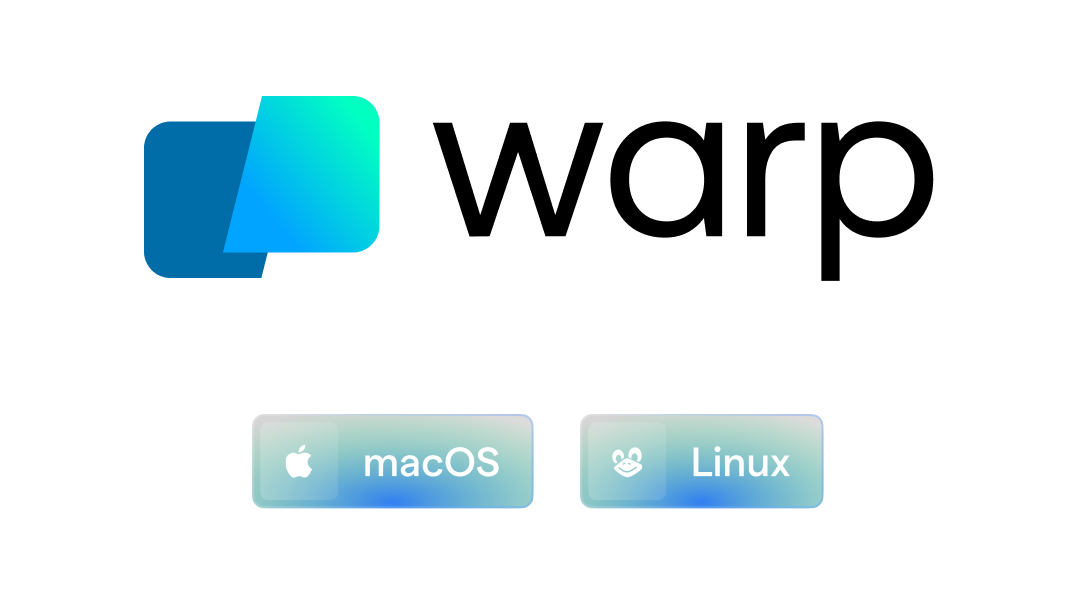
Visit warp.dev to learn more.



 ### Pros.
- Easy to set up: Single file. No boilerplate code required.
- Easy to use: Concise, intuitive syntax
- [Super-fast][40/4] parallel installation/update
(with any of `+job`, `+python`, `+python3`, `+ruby`, or [Neovim][nv])
- Creates shallow clones to minimize disk space usage and download time
- On-demand loading for [faster startup time][startup-time]
- Can review and rollback updates
- Branch/tag/commit support
- Post-update hooks
- Support for externally managed plugins
[40/4]: https://raw.githubusercontent.com/junegunn/i/master/vim-plug/40-in-4.gif
[nv]: http://neovim.org/
[startup-time]: https://github.com/junegunn/vim-startuptime-benchmark#result
### Installation
[Download plug.vim](https://raw.githubusercontent.com/junegunn/vim-plug/master/plug.vim)
and put it in the "autoload" directory.
#### Vim
###### Unix
```sh
curl -fLo ~/.vim/autoload/plug.vim --create-dirs \
https://raw.githubusercontent.com/junegunn/vim-plug/master/plug.vim
```
You can automate the process by putting the command in your Vim configuration
file as suggested [here][auto].
[auto]: https://github.com/junegunn/vim-plug/wiki/tips#automatic-installation
###### Windows (PowerShell)
```powershell
iwr -useb https://raw.githubusercontent.com/junegunn/vim-plug/master/plug.vim |`
ni $HOME/vimfiles/autoload/plug.vim -Force
```
#### Neovim
###### Unix, Linux
```sh
sh -c 'curl -fLo "${XDG_DATA_HOME:-$HOME/.local/share}"/nvim/site/autoload/plug.vim --create-dirs \
https://raw.githubusercontent.com/junegunn/vim-plug/master/plug.vim'
```
###### Linux (Flatpak)
```sh
curl -fLo ~/.var/app/io.neovim.nvim/data/nvim/site/autoload/plug.vim --create-dirs \
https://raw.githubusercontent.com/junegunn/vim-plug/master/plug.vim
```
###### Windows (PowerShell)
```powershell
iwr -useb https://raw.githubusercontent.com/junegunn/vim-plug/master/plug.vim |`
ni "$(@($env:XDG_DATA_HOME, $env:LOCALAPPDATA)[$null -eq $env:XDG_DATA_HOME])/nvim-data/site/autoload/plug.vim" -Force
```
### Getting Help
- See [tutorial] page to learn the basics of vim-plug
- See [tips] and [FAQ] pages for common problems and questions
- See [requirements] page for debugging information & tested configurations
- Create an [issue](https://github.com/junegunn/vim-plug/issues/new)
[tutorial]: https://github.com/junegunn/vim-plug/wiki/tutorial
[tips]: https://github.com/junegunn/vim-plug/wiki/tips
[FAQ]: https://github.com/junegunn/vim-plug/wiki/faq
[requirements]: https://github.com/junegunn/vim-plug/wiki/requirements
### Usage
Add a vim-plug section to your `~/.vimrc` (or `stdpath('config') . '/init.vim'` for Neovim)
1. Begin the section with `call plug#begin([PLUGIN_DIR])`
1. List the plugins with `Plug` commands
1. `call plug#end()` to update `&runtimepath` and initialize plugin system
- Automatically executes `filetype plugin indent on` and `syntax enable`.
You can revert the settings after the call. e.g. `filetype indent off`, `syntax off`, etc.
1. Reload the file or restart Vim and run `:PlugInstall` to install plugins.
#### Example
```vim
call plug#begin()
" The default plugin directory will be as follows:
" - Vim (Linux/macOS): '~/.vim/plugged'
" - Vim (Windows): '~/vimfiles/plugged'
" - Neovim (Linux/macOS/Windows): stdpath('data') . '/plugged'
" You can specify a custom plugin directory by passing it as the argument
" - e.g. `call plug#begin('~/.vim/plugged')`
" - Avoid using standard Vim directory names like 'plugin'
" Make sure you use single quotes
" Shorthand notation for GitHub; translates to https://github.com/junegunn/vim-easy-align
Plug 'junegunn/vim-easy-align'
" Any valid git URL is allowed
Plug 'https://github.com/junegunn/seoul256.vim.git'
" Using a tagged release; wildcard allowed (requires git 1.9.2 or above)
Plug 'fatih/vim-go', { 'tag': '*' }
" Using a non-default branch
Plug 'neoclide/coc.nvim', { 'branch': 'release' }
" Use 'dir' option to install plugin in a non-default directory
Plug 'junegunn/fzf', { 'dir': '~/.fzf' }
" Post-update hook: run a shell command after installing or updating the plugin
Plug 'junegunn/fzf', { 'dir': '~/.fzf', 'do': './install --all' }
" Post-update hook can be a lambda expression
Plug 'junegunn/fzf', { 'do': { -> fzf#install() } }
" If the vim plugin is in a subdirectory, use 'rtp' option to specify its path
Plug 'nsf/gocode', { 'rtp': 'vim' }
" On-demand loading: loaded when the specified command is executed
Plug 'preservim/nerdtree', { 'on': 'NERDTreeToggle' }
" On-demand loading: loaded when a file with a specific file type is opened
Plug 'tpope/vim-fireplace', { 'for': 'clojure' }
" Unmanaged plugin (manually installed and updated)
Plug '~/my-prototype-plugin'
" Initialize plugin system
" - Automatically executes `filetype plugin indent on` and `syntax enable`.
call plug#end()
" You can revert the settings after the call like so:
" filetype indent off " Disable file-type-specific indentation
" syntax off " Disable syntax highlighting
```
#### Example (Lua configuration for Neovim)
In Neovim, you can write your configuration in a Lua script file named
`init.lua`. The following code is the Lua script equivalent to the VimScript
example above.
```lua
local vim = vim
local Plug = vim.fn['plug#']
vim.call('plug#begin')
-- Shorthand notation for GitHub; translates to https://github.com/junegunn/vim-easy-align
Plug('junegunn/vim-easy-align')
-- Any valid git URL is allowed
Plug('https://github.com/junegunn/seoul256.vim.git')
-- Using a tagged release; wildcard allowed (requires git 1.9.2 or above)
Plug('fatih/vim-go', { ['tag'] = '*' })
-- Using a non-default branch
Plug('neoclide/coc.nvim', { ['branch'] = 'release' })
-- Use 'dir' option to install plugin in a non-default directory
Plug('junegunn/fzf', { ['dir'] = '~/.fzf' })
-- Post-update hook: run a shell command after installing or updating the plugin
Plug('junegunn/fzf', { ['dir'] = '~/.fzf', ['do'] = './install --all' })
-- Post-update hook can be a lambda expression
Plug('junegunn/fzf', { ['do'] = function()
vim.fn['fzf#install']()
end })
-- If the vim plugin is in a subdirectory, use 'rtp' option to specify its path
Plug('nsf/gocode', { ['rtp'] = 'vim' })
-- On-demand loading: loaded when the specified command is executed
Plug('preservim/nerdtree', { ['on'] = 'NERDTreeToggle' })
-- On-demand loading: loaded when a file with a specific file type is opened
Plug('tpope/vim-fireplace', { ['for'] = 'clojure' })
-- Unmanaged plugin (manually installed and updated)
Plug('~/my-prototype-plugin')
vim.call('plug#end')
```
More examples can be found in:
* https://gitlab.com/sultanahamer/dotfiles/-/blob/master/nvim/lua/plugins.lua?ref_type=heads
### Commands
| Command | Description |
| ----------------------------------- | ------------------------------------------------------------------ |
| `PlugInstall [name ...] [#threads]` | Install plugins |
| `PlugUpdate [name ...] [#threads]` | Install or update plugins |
| `PlugClean[!]` | Remove unlisted plugins (bang version will clean without prompt) |
| `PlugUpgrade` | Upgrade vim-plug itself |
| `PlugStatus` | Check the status of plugins |
| `PlugDiff` | Examine changes from the previous update and the pending changes |
| `PlugSnapshot[!] [output path]` | Generate script for restoring the current snapshot of the plugins |
### `Plug` options
| Option | Description |
| ----------------------- | ----------------------------------------------------------- |
| `branch`/`tag`/`commit` | Branch/tag/commit of the repository to use |
| `rtp` | Subdirectory that contains Vim plugin |
| `dir` | Custom directory for the plugin |
| `as` | Use different name for the plugin |
| `do` | Post-update hook (string or funcref) |
| `on` | On-demand loading: Commands or `
### Pros.
- Easy to set up: Single file. No boilerplate code required.
- Easy to use: Concise, intuitive syntax
- [Super-fast][40/4] parallel installation/update
(with any of `+job`, `+python`, `+python3`, `+ruby`, or [Neovim][nv])
- Creates shallow clones to minimize disk space usage and download time
- On-demand loading for [faster startup time][startup-time]
- Can review and rollback updates
- Branch/tag/commit support
- Post-update hooks
- Support for externally managed plugins
[40/4]: https://raw.githubusercontent.com/junegunn/i/master/vim-plug/40-in-4.gif
[nv]: http://neovim.org/
[startup-time]: https://github.com/junegunn/vim-startuptime-benchmark#result
### Installation
[Download plug.vim](https://raw.githubusercontent.com/junegunn/vim-plug/master/plug.vim)
and put it in the "autoload" directory.
#### Vim
###### Unix
```sh
curl -fLo ~/.vim/autoload/plug.vim --create-dirs \
https://raw.githubusercontent.com/junegunn/vim-plug/master/plug.vim
```
You can automate the process by putting the command in your Vim configuration
file as suggested [here][auto].
[auto]: https://github.com/junegunn/vim-plug/wiki/tips#automatic-installation
###### Windows (PowerShell)
```powershell
iwr -useb https://raw.githubusercontent.com/junegunn/vim-plug/master/plug.vim |`
ni $HOME/vimfiles/autoload/plug.vim -Force
```
#### Neovim
###### Unix, Linux
```sh
sh -c 'curl -fLo "${XDG_DATA_HOME:-$HOME/.local/share}"/nvim/site/autoload/plug.vim --create-dirs \
https://raw.githubusercontent.com/junegunn/vim-plug/master/plug.vim'
```
###### Linux (Flatpak)
```sh
curl -fLo ~/.var/app/io.neovim.nvim/data/nvim/site/autoload/plug.vim --create-dirs \
https://raw.githubusercontent.com/junegunn/vim-plug/master/plug.vim
```
###### Windows (PowerShell)
```powershell
iwr -useb https://raw.githubusercontent.com/junegunn/vim-plug/master/plug.vim |`
ni "$(@($env:XDG_DATA_HOME, $env:LOCALAPPDATA)[$null -eq $env:XDG_DATA_HOME])/nvim-data/site/autoload/plug.vim" -Force
```
### Getting Help
- See [tutorial] page to learn the basics of vim-plug
- See [tips] and [FAQ] pages for common problems and questions
- See [requirements] page for debugging information & tested configurations
- Create an [issue](https://github.com/junegunn/vim-plug/issues/new)
[tutorial]: https://github.com/junegunn/vim-plug/wiki/tutorial
[tips]: https://github.com/junegunn/vim-plug/wiki/tips
[FAQ]: https://github.com/junegunn/vim-plug/wiki/faq
[requirements]: https://github.com/junegunn/vim-plug/wiki/requirements
### Usage
Add a vim-plug section to your `~/.vimrc` (or `stdpath('config') . '/init.vim'` for Neovim)
1. Begin the section with `call plug#begin([PLUGIN_DIR])`
1. List the plugins with `Plug` commands
1. `call plug#end()` to update `&runtimepath` and initialize plugin system
- Automatically executes `filetype plugin indent on` and `syntax enable`.
You can revert the settings after the call. e.g. `filetype indent off`, `syntax off`, etc.
1. Reload the file or restart Vim and run `:PlugInstall` to install plugins.
#### Example
```vim
call plug#begin()
" The default plugin directory will be as follows:
" - Vim (Linux/macOS): '~/.vim/plugged'
" - Vim (Windows): '~/vimfiles/plugged'
" - Neovim (Linux/macOS/Windows): stdpath('data') . '/plugged'
" You can specify a custom plugin directory by passing it as the argument
" - e.g. `call plug#begin('~/.vim/plugged')`
" - Avoid using standard Vim directory names like 'plugin'
" Make sure you use single quotes
" Shorthand notation for GitHub; translates to https://github.com/junegunn/vim-easy-align
Plug 'junegunn/vim-easy-align'
" Any valid git URL is allowed
Plug 'https://github.com/junegunn/seoul256.vim.git'
" Using a tagged release; wildcard allowed (requires git 1.9.2 or above)
Plug 'fatih/vim-go', { 'tag': '*' }
" Using a non-default branch
Plug 'neoclide/coc.nvim', { 'branch': 'release' }
" Use 'dir' option to install plugin in a non-default directory
Plug 'junegunn/fzf', { 'dir': '~/.fzf' }
" Post-update hook: run a shell command after installing or updating the plugin
Plug 'junegunn/fzf', { 'dir': '~/.fzf', 'do': './install --all' }
" Post-update hook can be a lambda expression
Plug 'junegunn/fzf', { 'do': { -> fzf#install() } }
" If the vim plugin is in a subdirectory, use 'rtp' option to specify its path
Plug 'nsf/gocode', { 'rtp': 'vim' }
" On-demand loading: loaded when the specified command is executed
Plug 'preservim/nerdtree', { 'on': 'NERDTreeToggle' }
" On-demand loading: loaded when a file with a specific file type is opened
Plug 'tpope/vim-fireplace', { 'for': 'clojure' }
" Unmanaged plugin (manually installed and updated)
Plug '~/my-prototype-plugin'
" Initialize plugin system
" - Automatically executes `filetype plugin indent on` and `syntax enable`.
call plug#end()
" You can revert the settings after the call like so:
" filetype indent off " Disable file-type-specific indentation
" syntax off " Disable syntax highlighting
```
#### Example (Lua configuration for Neovim)
In Neovim, you can write your configuration in a Lua script file named
`init.lua`. The following code is the Lua script equivalent to the VimScript
example above.
```lua
local vim = vim
local Plug = vim.fn['plug#']
vim.call('plug#begin')
-- Shorthand notation for GitHub; translates to https://github.com/junegunn/vim-easy-align
Plug('junegunn/vim-easy-align')
-- Any valid git URL is allowed
Plug('https://github.com/junegunn/seoul256.vim.git')
-- Using a tagged release; wildcard allowed (requires git 1.9.2 or above)
Plug('fatih/vim-go', { ['tag'] = '*' })
-- Using a non-default branch
Plug('neoclide/coc.nvim', { ['branch'] = 'release' })
-- Use 'dir' option to install plugin in a non-default directory
Plug('junegunn/fzf', { ['dir'] = '~/.fzf' })
-- Post-update hook: run a shell command after installing or updating the plugin
Plug('junegunn/fzf', { ['dir'] = '~/.fzf', ['do'] = './install --all' })
-- Post-update hook can be a lambda expression
Plug('junegunn/fzf', { ['do'] = function()
vim.fn['fzf#install']()
end })
-- If the vim plugin is in a subdirectory, use 'rtp' option to specify its path
Plug('nsf/gocode', { ['rtp'] = 'vim' })
-- On-demand loading: loaded when the specified command is executed
Plug('preservim/nerdtree', { ['on'] = 'NERDTreeToggle' })
-- On-demand loading: loaded when a file with a specific file type is opened
Plug('tpope/vim-fireplace', { ['for'] = 'clojure' })
-- Unmanaged plugin (manually installed and updated)
Plug('~/my-prototype-plugin')
vim.call('plug#end')
```
More examples can be found in:
* https://gitlab.com/sultanahamer/dotfiles/-/blob/master/nvim/lua/plugins.lua?ref_type=heads
### Commands
| Command | Description |
| ----------------------------------- | ------------------------------------------------------------------ |
| `PlugInstall [name ...] [#threads]` | Install plugins |
| `PlugUpdate [name ...] [#threads]` | Install or update plugins |
| `PlugClean[!]` | Remove unlisted plugins (bang version will clean without prompt) |
| `PlugUpgrade` | Upgrade vim-plug itself |
| `PlugStatus` | Check the status of plugins |
| `PlugDiff` | Examine changes from the previous update and the pending changes |
| `PlugSnapshot[!] [output path]` | Generate script for restoring the current snapshot of the plugins |
### `Plug` options
| Option | Description |
| ----------------------- | ----------------------------------------------------------- |
| `branch`/`tag`/`commit` | Branch/tag/commit of the repository to use |
| `rtp` | Subdirectory that contains Vim plugin |
| `dir` | Custom directory for the plugin |
| `as` | Use different name for the plugin |
| `do` | Post-update hook (string or funcref) |
| `on` | On-demand loading: Commands or `